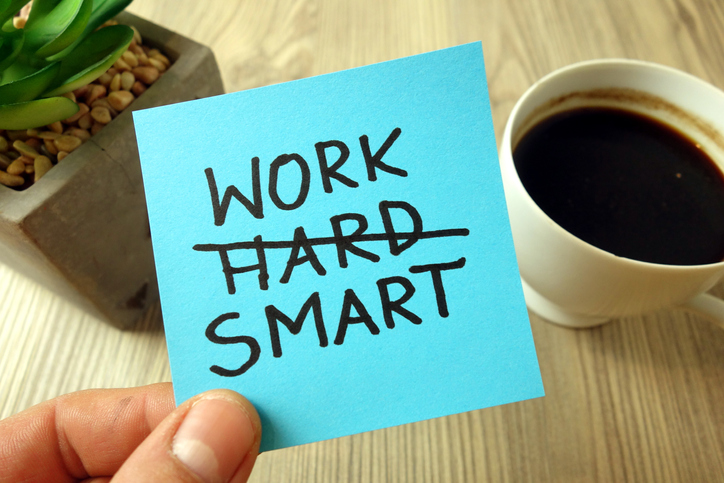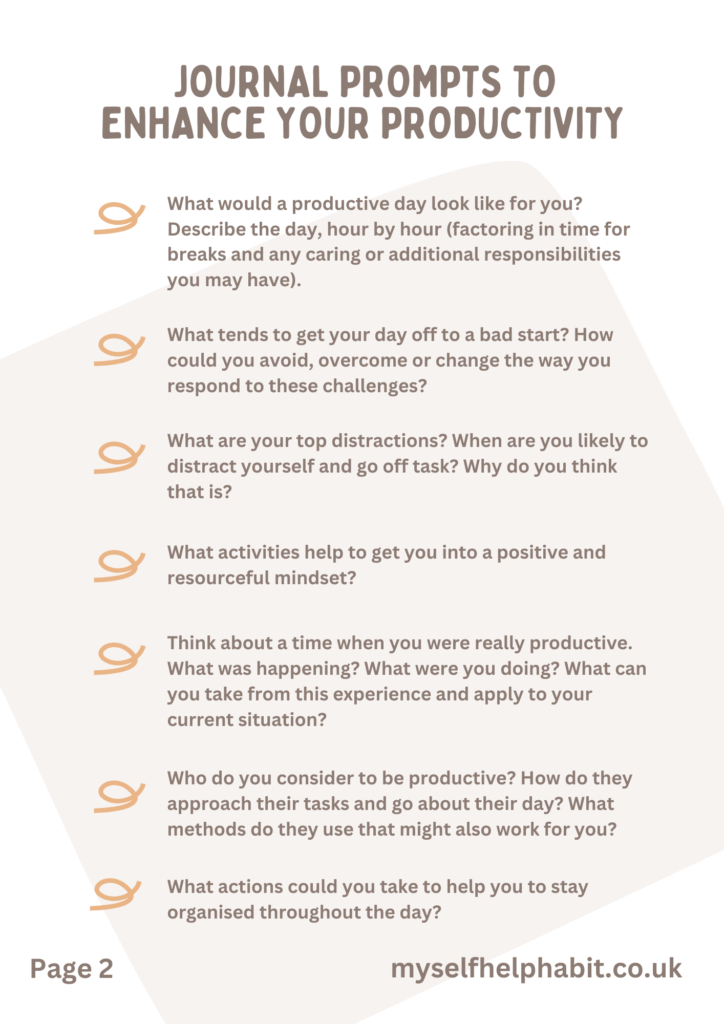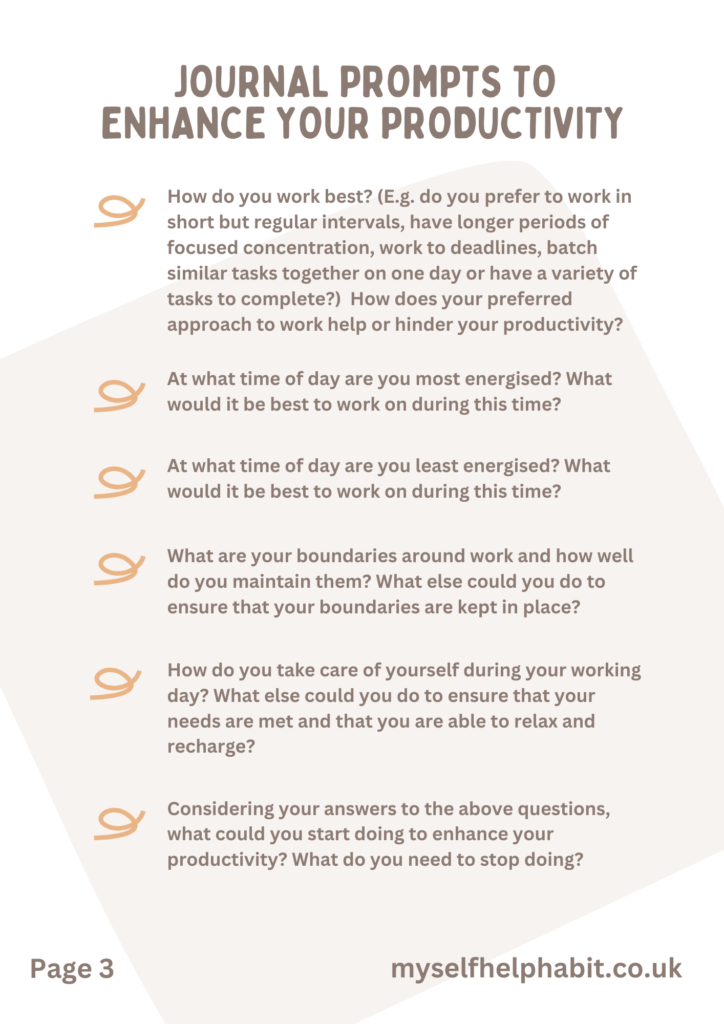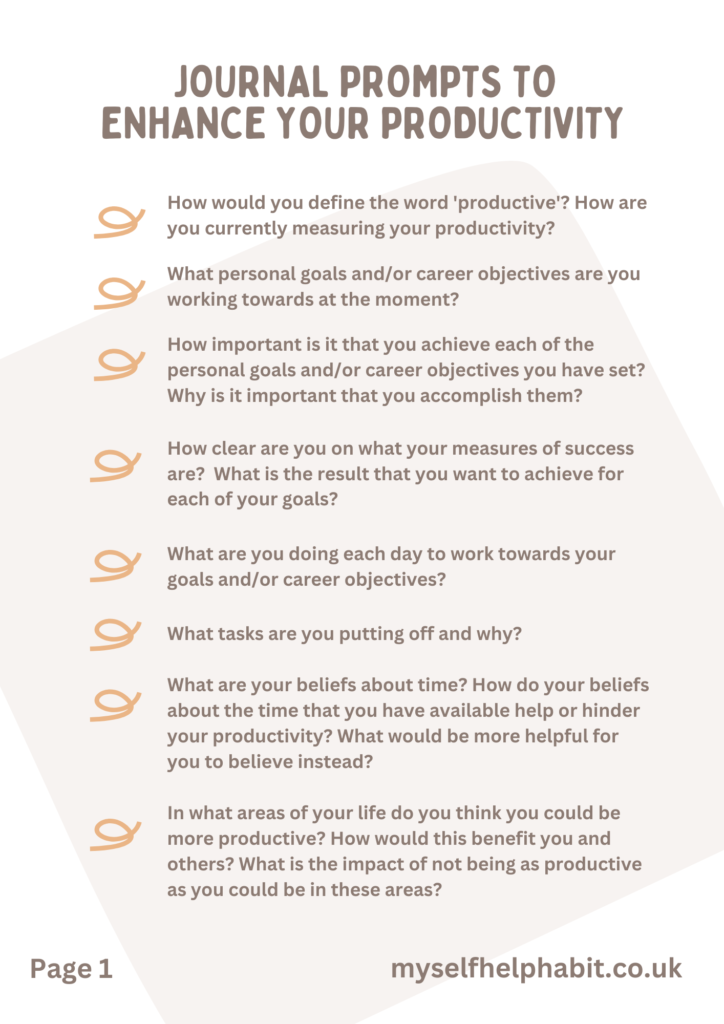
Make your day work for you!
Sometimes it seems like we are at the mercy of the day’s events! We might start off with the best of intentions, that we are going to have a highly productive day, breeze through our tasks and bask in that wonderful feeling of satisfaction and accomplishment by the end of it…. Yet we find ourselves having to sort out an array of issues that pop out of nowhere and just seem to get sidetracked and distracted throughout the day. By the time we manage to put our feet up, we realise that we have done very little of what we actually needed (or wanted) to do!
While we are not always fully in control of what happens during the day, our routines, daily habits and responses can either support or hinder us in our quest to be more productive and achieve the goals that we have set.
If you want to stop getting derailed, and gain more control over how your time is spent, then read this post for some ideas on how to:
- get your day off to a good start
- ensure that the right tasks make it onto your ‘To Do’ list
- minimise interruptions and distractions
- stay organised and on top of things (even if the day goes awry)
- incorporate regular breaks into your schedule so that it is not all go!
Once you have read through the post, there are 3 pages of journal prompts for you to download (just click on the image below) to help you to think about what you could do to enhance your productivity.


Set yourself up for success
Firstly, there is some groundwork that you need to undertake to ensure that your days are more organised and productive:
What are your long-term goals or objectives?
Ideally your day to day tasks will be helping you to build the kind of life you want and, in a work context, to achieve the objectives you have set. Yes, the routine and mundane tasks will be in there too but part of being productive means getting clear on what you are working towards (and why it is important), knowing what results or outcomes you are aiming to accomplish, and being able to distinguish between what tasks are really important and what are less so. It is not necessarily all about how much you are getting done (though that may be one of many different measures of productivity).
If you haven’t set any personal or career-related goals yet then take a look at my post on goal setting and have a go at some of the free coaching tools I have provided such as the Wheel of Life, Ideal Day exercise, living by your core values and finding your focus for the year ahead.
Invest in a planner
I have used a planner for about 3 years now to keep track of my goals and to schedule all of my activities. I sit down with my planner every Sunday night and write down any appointments that I have in the forthcoming week, the work related tasks I want to achieve, the chores, self-care activities and exercise sessions I want to do, and any school or after-school activities that the kids are involved in. I then check it every morning so that I know what I am doing each day. This process helps to keep me organised and focused!
There are a huge variety of planners out there and I have tried quite a few. You can also get them in digital formats but I am a pen and paper kinda gal! I have used The Positive Planner, Breathe Magazine’s 52 Week Planner and, my current one, the Life Planner from Martha Brook. A planner will usually provide some space for you to write down your yearly and monthly goals and to reflect on your progress as you go along. You can slot the activities that will help you to achieve your goals into the weekly schedules that the planners provide.
Raise your awareness of how you use your time
Keep a log of how you use your time during a typical working week. This helps you to see how long things really take and where your time goes. Look for any patterns and identify what you biggest time stealers are (remember perfectionism and people pleasing, though not obvious from your time log, may also be an issue!) With this awareness you can look at what needs to change and think about what you can do differently.
Try to be really discerning about what you do with your time by questioning the reasons for doing some tasks and whether they are things that you need to do right now (perhaps you could delegate or defer them or not do them at all?) You could simply ask:
- Why am I doing this?
- Is this something I have to do?
- Is this something I think I ‘should’ do? Why is that?
- What would happen if I did not do this? (List out both the pros and cons of not doing the task)
You could also question the processes involved in carrying out your tasks. How could you make your tasks easier to carry out? Is there a more efficient way of doing something? Could you automate the task in any way?
Ask for help
What support do you need to enable you to achieve your work objectives and personal goals?
It might be difficult to acknowledge at first, especially if you are not used to asking for help, but if you know that you use some support then it is absolutely OK to ask for what you need. You don’t have to take everything on and figure things out all on your own! Save yourself some time and energy by allowing others to help you.
Be Prepared!
After work routine
If you haven’t already got a standard finish time then set yourself a sensible time for completing your work for the day and commit to logging off at that time. There is no good overworking and then feeling groggy the next day (with yet more work to do).
When you are at the end of your working day, write a note to yourself about where you have got to with your tasks as this will make it easier to pick up where you left off. While you are at it, you could even write out what tasks need to be done the next day and check your calendar/planner to remind yourself of any forthcoming appointments. I find that this whole process provides a nice bit of closure to the working day and makes me feel that little bit more prepared for the day ahead.
You can also free up some mental energy by limiting the decisions you have to make each day (especially first thing in the morning) and doing some advanced preparation. Look at your daily routine and think about what you could do to make it easier. What obstacles do you usually come across during your daily routine and how can you address those? This could be making travel arrangements in advance (and alternative ones!), meal planning, getting outfits/uniforms ready the night before, lining up what you are going to wear in the week, and ensuring bags and lunches are packed and ready to go for the morning. It may take some time to undertake these activities but they might just save you time and stress in the long run.
Wind down for the evening
Make sure that you are getting time to wind down in the evenings and are doing something that truly helps you to switch off. Tear yourself away from your laptop and phone and watch a film, do some mindful crafts or puzzles, take a relaxing bath, read a novel, chat with a loved one, meditate, write in your journal, etc.
And finally, try to get a good night’s sleep. Having trouble sleeping? Check out these tips from the NHS and The Sleep Charity.
You vs. the alarm clock!
As much as I love a few extra minutes (or ten) in bed, I know that when I crawl out of bed late I end up getting stressed and it often has a negative impact on the rest of my day.
Determine how much time you are going to need in the morning to get yourself ready and to do whatever needs doing before you leave the house or start work. Try to be as accurate as possible or, as time seems to fly in the mornings, it might even be better to slightly over-estimate the time you need.
Set your alarm for when you need to get up in order to have a stress-free day (and then actually get up at that time!) Avoid the temptation to hit snooze by putting your alarm clock over the other side of the room or don’t select the snooze option in the first place (ohhh risky!)
There are also apps that make hitting snooze and turning off the alarm a lot more challenging than your phone does so it might be worth searching for an alarm clock app and using that instead.
How to take control of your day
Get yourself into a positive state
Do what you need to do to get yourself into a positive and resourceful state of mind (if you are not already!) Maybe there was a row before you went out the door, an incident on the school run, a post or news article that triggered you, a nightmare traffic jam or you had a bad night’s sleep. All of these events can affect our mood and leave us feeling low in motivation.
Before you get to work, do what you can to centre yourself and get back in the zone. The following activities may help to you to do this:
- Meditation
- Breathwork – Try out these beginner breathwork techniques from MindBodyGreen.
- Gratitude practice – The Greater Good Science Center offer some suggestions for helping you to acknowledge and appreciate the good things in the day.
- Reading and reciting encouraging affirmations (check out this article from fiercekindness.com on creating affirmations that you can actually believe!)
- Listening to an inspirational talk, podcast or kickass playlist
- Writing down your thoughts in a journal and questioning any unhelpful thinking habits that you are able to identify.
- Taking a step back and working through a problem using a step by step process (try this Problem Solving Worksheet from getselfhelp.co.uk)
- A walk or a short exercise routine to clear your head and give yourself a boost of energy
- Putting on your favourite outfit, make-up or skincare
- Staying away from social media or the news
Put your focus back on what you want your day to be about, what you would like to achieve and, overall, how you would like to feel by the end of it.
Identify your MITs
If you haven’t already done so during your end of work routine then identify what your Most Important Tasks are for the day. This ensures that you are focusing your time and energy on the things that are really going to make a positive difference and help you to meet your goals/objectives. It also makes it easier to recognise and say no to things that are less important (or just sheer distractions!)
Get clear on what you can realistically achieve in the time that you have available (considering any other commitments) and how you will know when you have successfully completed a task (e.g. what will you have by the end of the day?)
Try to note down no more than 3 tasks to avoid overwhelm (and the temptation to work on less important tasks!) Check that the tasks you have written down really are urgent or important. Think about why you are doing them in the first place and what results or outcomes they are likely to generate.
If you have a long list of tasks then you can prioritise them by considering the following questions:
- Is there anything that absolutely must get done today (are there any time sensitive tasks)?
- Imagine if you had only one task that you could get done today, what would that be and why?
- Which task/s would make the most difference in moving you towards your objectives/goals?
Once you have your 3 Most Important Tasks listed out, make sure that you have been specific about what you are going to do and what you want to have achieved by the end of the time you have allocated. Then, work through your To Do list and try to focus on completing one task at a time.
Eat that frog!
As Brian Tracy explains in his bestselling book, Eat That Frog*, a ‘frog’ is:
your biggest, most important task, the one you are most likely to procrastinate on if you don’t do something about it. It is also the one task that can have the greatest positive impact on your life and results at the moment.
Eat That Frog by Brian Tracy, p.2
*Disclosure: If you buy books linked to my site, I may earn a commission from Bookshop.org, whose fees support independent bookshops.
Look at your task list and identify what your ‘frog’ is and, if possible, get started on that one first. I like to eat my frog by lunchtime because, by the time I have settled down to my sandwiches, I feel a sense of accomplishment because I know that the most important and demanding task that I have on my list is already done or, at the very least, I have started to make progress on it!
Minimise disruptions and distractions
Note down all the things that tend to disrupt your day or give you a bad start (e.g. getting up late, not having everything ready before you go out the door, checking social media or the news before you’ve done anything else, constant interruptions or demands from others, etc.) and determine what changes you can make to avoid or overcome these disruptions.
Also, notice when you get distracted. What triggers it for you? What are the signs that you are procrastinating? Once you are aware of your triggers and behaviours, you can start exploring why this is happening and take some action to minimise or eliminate the distractions and deal with the causes of procrastination.
Saying ‘No’ and maintaining your boundaries
I know this can be incredibly difficult and all sorts of things can come into play (such as unequal power dynamics, toxic workplace cultures and our own long-held, unhelpful beliefs) which can then prevent us from asserting ourselves. However, unless you start changing your responses nothing else is likely to change and other people’s agendas and priorities will keep derailing you.
Look at what stops you from saying no:
- When do you find it difficult to say no? What makes it difficult for you?
- What is the payoff for saying ‘yes’ (what benefit do you get from it?) and what is the cost of saying yes?
Think about what you could start doing differently and if there are more helpful ways of thinking about those difficult situations which would enable you to say no more confidently.
You could take a step forward by practising saying no in other, more benign situations and gradually build up to the more difficult ones. You could also give yourself some time to think before you respond (e.g. ‘I will have to get back to you about that…’ or ‘I need to check…’) and rehearse some ways of politely saying no for times when you have to decline an offer or request (such as those suggested in this article by Jennifer Herrity, Career Coach at Indeed).
One of the best pieces of advice I have heard about boundaries is that no one will respect them unless you do! So, determine what your boundaries are, decide what is and is not acceptable to you in different areas of your life, communicate this clearly to those who need to know and (the hard bit) keep asserting and maintaining your boundaries.
Check-in with yourself
In the midst of all your daily tasks, pause and take a minute to ask yourself:
- How’s it going? Are you ahead or behind schedule? Do you need to reassess your priorities or adjust your expectations of what you can get done in the time that you have?
- How are you feeling? What do you need right now?
Remember, you can always have a reset and start the day afresh! Or perhaps you just need to…
Take a break
When life is full-on and work is busy it is tempting to plough through the day and jump from task to task, meeting to meeting, without so much as taking a breath, let alone any kind of break!
Are you giving yourself time in between meetings or tasks to recharge (or at least physically get to the next appointment)? Every job has its busy periods but if this is a daily occurrence then it might be time to start having some conversations with the ‘powers that be’ (or yourself!) and think about changes that could be made to the way that you work.
Here are some ways to give yourself some breathing space in the day:
- Time blocking – Block out the time you need in your diary for working on important tasks/projects and before or after meetings so that no one tries to nab those slots! This could mean giving yourself the time you need to travel, plan or prepare, take any urgent actions arising from the meeting, or simply to gather your thoughts, to process what has been said, and to write down any reflections (especially if you are engaged in any kind of reflective practice).
- Make your availability clear – While there may be occasions when you need to be flexible and accommodating with meeting times, make sure you calendar is up to date with your availability, let others know how your calendar works and how you prefer to be notified of meetings. Not only is this really helpful information for the meeting organiser, it can minimise the number of times you have to rush around and go to meetings that are at inconvenient times (or deal with diary clashes). If you use an online calendar it may also have options for you to set rules for booking meetings which will then automatically give you some space in between your appointments.
- Try the Pomodoro Technique – If you are working on a challenging or time-consuming task then see if you can work on it in short intervals to stop fatigue setting in (and to avoid the temptation to procrastinate). Break the task down into smaller sub-tasks to reduce any overwhelm and, using the Pomodoro Technique, set a timer and spend 25 minutes on it. After that time stop, move around, get yourself a drink or snack if needed, and then get back to the task for another 25 minutes.
- Make lunchtime, or another period of time when you can take a break, a complete non-negotiable. Block out the time in your calendar and protect it! If you fancy, add in an activity that you enjoy like reading a novel, taking a walk, or finding a space where you can mindfully eat your lunch in peace and quiet.
- Have at least one enjoyable thing to do in the day. Think about what helps you to relax and recharge and commit to sprinkling some ‘me time’ into your day whenever you can. It could be watching your favourite TV show or listening to a playlist or podcast while you are on the train to/from work, treating yourself to your favourite coffee or sandwich at lunchtime, having a mini pamper session once you are home, enjoying a mug of hot chocolate curled up on the sofa with a good book, or getting out your favourite craft activity.
By taking a break you can get mentally prepared for your next task or meeting and you will feel more refreshed and raring to go! Also, have you ever noticed that when you give yourself some time away from your work you start getting fresh ideas, can suddenly see things from different perspectives, and can come back to your tasks with renewed vigour? So, taking a break has its advantages for your work as well as your wellbeing!
Stay organised throughout the day
What daily habits could you create to help you to stay on top of things? Try some of these suggestions (if you haven’t already):
- Take notes during the day – Keep a notebook or notes file handy to capture the information, tasks or items that you need to remember. If you have a way of labelling and organising your notes so that you can easily refer to them later then even better!
- Put meetings or appointments straight into your calendar or planner – you could also include any brief notes that will help you to prepare for the meeting when it comes around. Alternatively, start using an online booking system that integrates with your calendar so that people can book in meetings and appointments according to your availability and the preferences you have set.
- Use reminders – Set yourself reminders for tasks, meetings/events and any other important things that you need to remember. You can do this simply via your calendar or by finding a task management app that works for you.
- Check your inbox regularly (but not constantly!) – Stay on top of any important messages that may arrive in your inbox by checking for emails at set times during the day and, depending on their level of importance, allocate some time to respond.
- Update your ‘To Do’ list – Keep yourself on track by crossing off and adding tasks accordingly.
- Keep you work area tidy – Before you switch off for the evening and dash out of the office, take a minute to close down any tabs that you no longer need to use, put away equipment, and keep any documents together that you need for a particular project or piece of work.
- Manage additional responsibilities – Set time aside in your day or week to keep on top of anything that you have responsibility for outside of your day job (like checking the endless notifications from schools or keeping track of any club\team\group WhatsApp messages). Make it a regular slot in your schedule – it might be a quieter part of your day (though not right before bed!) or when there is ‘dead time’ like commuting on the train. If you are involved in any additional activities outside of your day job then manage expectations carefully, make sure other members are aware of your availability, and seek more support if needed.
Hang on, what about when life gets in the way?
Of course, there is absolutely no guarantee that our plans for the day will go smoothly. It could be that one of the kids gets sent home from school, your train is cancelled at the last minute, or you wake up with a bad headache, etc. Life happens regardless of our plans!
Here are a few actions that you can take when things are not going your way:
- Look at what you can control – What can you do in this particular situation? How can you choose to respond? Put together a ‘Plan B’ and, if possible, find out who could give you some help and support.
- Think ‘BTN‘ – Look at your task list and ask yourself: What would be Better Than Nothing? I first heard this term in the context of building habits (i.e. making the habit that you want to build so easy and simple to carry out that it is relatively effortless). I found that this could also be applied to my workload when things were busy. I could decide whether spending 5-10 minutes on something would be ‘better than nothing’ or if I could take some ‘nice to do’ but less important steps out of a task to reduce it down to what was most essential to accomplish. You may have to lower your expectations or standards slightly but you will at least make a bit of progress and get something done (and in my experience it will probably still be sufficient!)
- Reflect and make improvements – What can you learn from this situation? If the day didn’t go as planned then identify why that was and, ensuring that you are kind to yourself in the process, think about any tweaks or improvements that need to be made.
- Focus on what you have got done and what has gone well – Acknowledge yourself for anything that you have managed to do during the day (no matter how small it may seem) and, if you’ve had to take a break, give yourself a pat on the back for taking good care of yourself (or others)!
If you know what your goals or objectives are and have your tasks planned out then you won’t stay off track for long. You can rearrange your priorities and pick your tasks up again at a later time or on another day. If you do need to hand something over and have planned everything in advance then at least you will know exactly what needs doing and will be able to communicate that clearly to whoever is providing cover for you.
It may take some trial and error, self-reflection and feedback from others until you find a way of working that suits you and enhances your productivity. I hope that the tips in this post, and the accompanying journal prompts, are useful for you to consider and help you get more of the things done that will make the biggest and most positive difference to your life and career.





